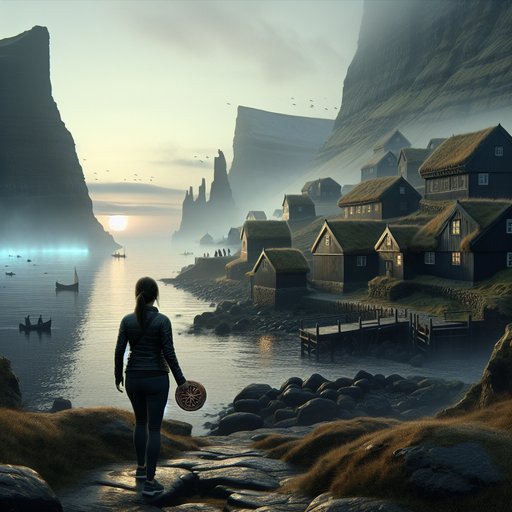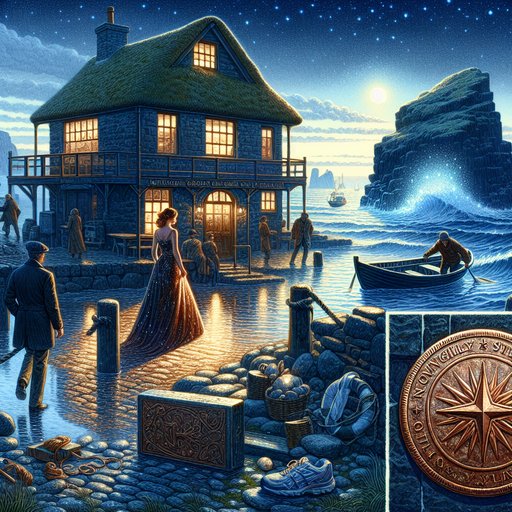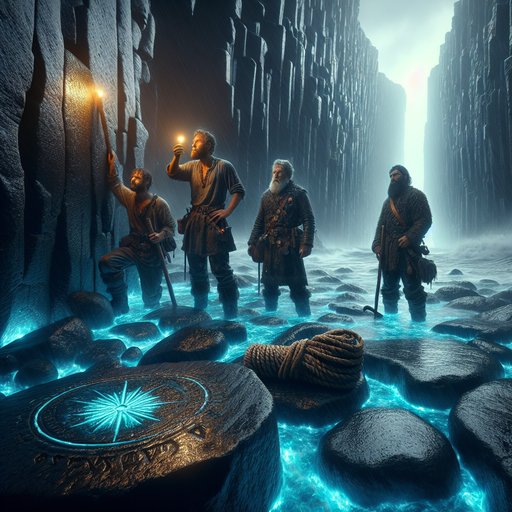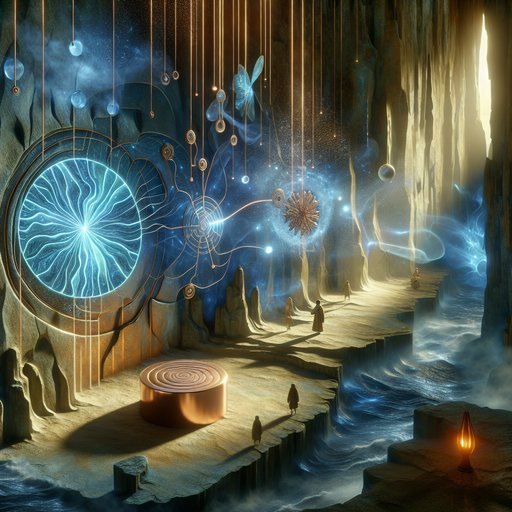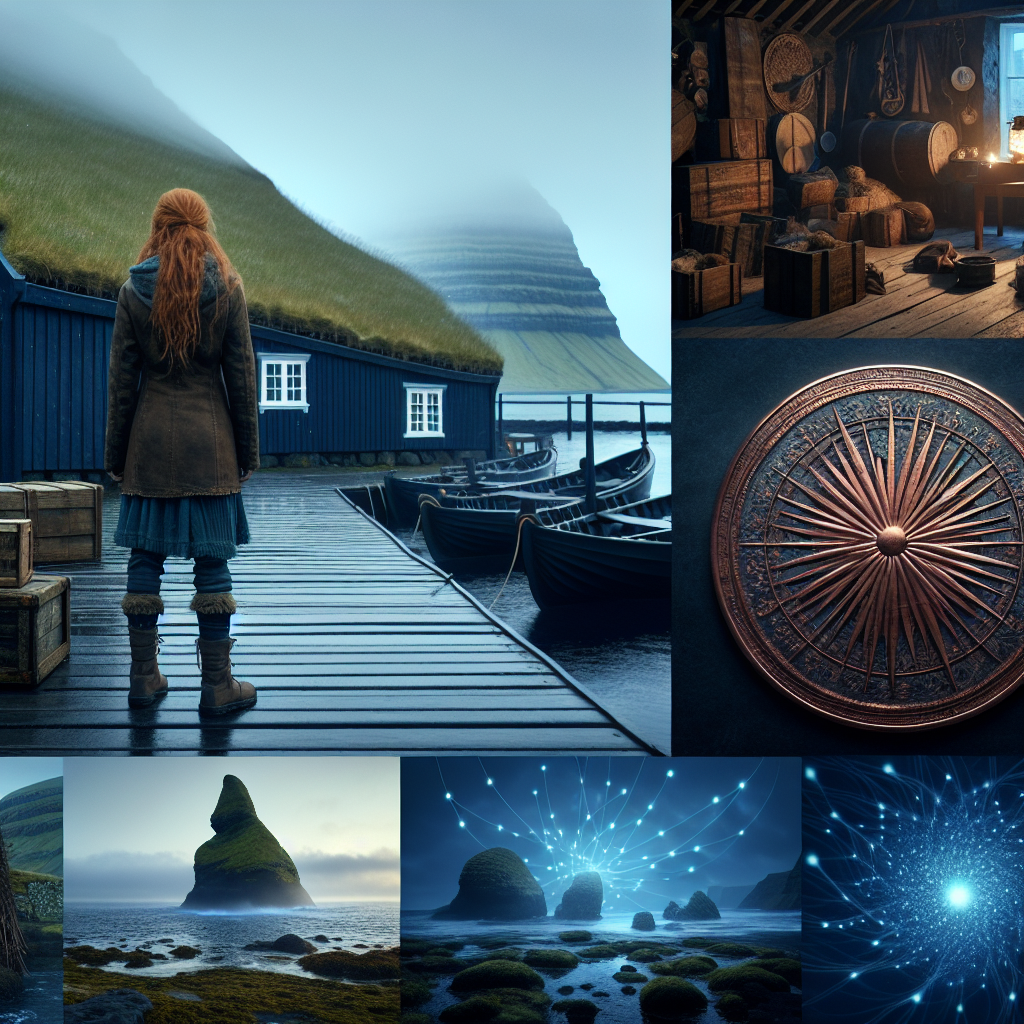CHAPTER 4 - The Arrow of Shadow and the False Blue Sun
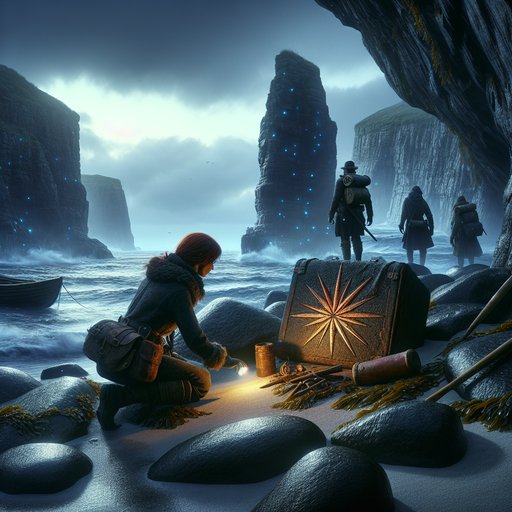
At the kelp-choked cleft, two locals step from a skiff and confront Barbra Dender, the 31-year-old redhead investigating the Blue Sun on Suðuroy. Earning a shard of their trust through her calm honesty, she receives a new clue: follow the arrow stone when the sea stack’s shadow touches the cleft and bring no light. Inside, she discovers a carved starburst and a hidden niche containing a copper lens, a bone flute, and a map fragment. The lens casts a blue halo, offering thrilling insight—until she realizes it’s a planted decoy meant to mislead outsiders. Forced to start over, Barbra returns to the cliffs and reframes the puzzle around sound rather than light, mapping the cave’s “song” by timing wave beats. Her acoustic triangulation leads her to a different, tighter fissure marked by another starburst and the word BLÁSÓL with “skuggi”—shadow. The cave breathes a deeper, truer music, and bioluminescent flecks glimmer as she creeps inward. Just as the pattern begins to make sense, the locals reappear with a third figure and the tide surges, demanding a choice that lands her in a perilous cliffhanger.
The boat’s engine died to a cough and a shiver, and the sea stack’s shadow slid like a blade over the kelp-choked cleft. Barbra braced her blue and white Asics on wet stone, her leather jacket zipped against the hiss of spray, one palm on the copper disk in her pocket. The halo she’d seen minutes ago had thinned to a bruise of color, a memory clinging to the air, while the cave’s low song thickened with the turning tide. Two figures splashed from the skiff and came up the weed-slick ledge opposite her.
Their silhouettes were as stark as the cliffs: a woman with wind-knotted gray hair and a man with shoulders set like a door barred from the inside. “Leave,” the man said in Faroese-accented English, not unkind, but with the certainty of rock. The woman looked Barbra over without flinching, taking in the freckles Barbra detested and the stubbornness behind her eyes. “It’s not for tourists.” Barbra had heard that tone since she was four and left to navigate rooms full of adult grief; she had learned then how to be alone, how to do for herself, how to stand without being invited.
“I’m not here for a souvenir,” she said, thinking of the glass cabinet back home and how its artifacts were promises to herself, not trophies. She drew the copper disk halfway from her pocket, just enough for the etched starburst and the word BLÁSÓL to catch the failing light. “Someone slid a note under my door. Singing cave.
No light,” she said. “And your anchor plaque repeats the same numbers.” The man’s eyes flickered. The woman picked something from her teeth with a fingernail, then nodded to the sea stack, where its shadow was crawling across the water. “You hear it?” she asked.
Barbra tilted her head; beneath the wind, the cave hummed in pulses that came not randomly but at intervals—breaths of stone in four-beat measures that shortened as the tide tightened its grip. “Not just wind,” Barbra said. “Timing. Pressure.” The woman smiled—a quick cut of approval.
“Rannvá,” she said, touching her own chest. “My brother Páll. If you must, follow the arrow stone only when the stack’s shadow kisses the cleft. Do not bring light, do not bring iron, do not bring any metal charms but that old disk.” Páll scowled but didn’t contradict her, and the woman’s gaze softened into something like respect that Barbra didn’t take lightly.
“If you lie or take, the sea will know,” Rannvá added, and then they stepped back, leaving kelp springs in their wake. At the next slack, Barbra watched the shadow creep to the arrow carved on the half-buried stone she’d found that morning. The numbers on the disk and the harbor plaque matched the pause in the water’s pull; her phone stayed in her jacket, screen dark, a promise kept. She slid sideways into the cleft, a cold stink of kelp sealing around her ankles, the walls narrowing until the leather of her jacket scraped.
Singing rose in her sternum, not a sound so much as a pressure moving through bone. Deeper in, her fingers found the starburst carved into a rib of rock, and beside it a shallow notch shaped like the disk. She hesitated, then set the salt-crusted copper into the niche. Something within the wall answered with a dull internal knock, like a heart behind ribs.
A seam she hadn’t seen parted with a wet sigh; a palm-wide gap opened to reveal a stone shelf and a coffer the size of a shoebox, bound with verdigrised brass. Her own breath felt huge in the dark as she worried the clasp open, knuckles numbing in the cold. Inside, wrapped in oilskin, lay a bone flute, a fragment of a map marked with more starbursts, and a copper lens the size of her palm. She lifted the lens first because it gleamed even in the cavern’s breath, its surface mottled like patina and yet oddly smooth.
When she moved it between her eye and the slot of day outside, the world drooped, then a corona of cobalt bloomed, a blue rim that seemed to drink the light and pour it back with a secret inside. Her heart thumped—this was it, the Blue Sun at her fingertips. The bone flute felt ancient, oil-slick to the touch, its holes worn oval. The map fragment shivered in the draft, its inked arrows pointing toward drawn cliffs she thought she recognized.
Outside, she held up the lens again as cloud peeled from the sun. Blue ignited around the edge of the sea stack like a saint’s aura, and her laughter shot out of her before she could stop it. But then the light shifted just a little, and the same corona blossomed around a whalebone post farther down the shore, the same around the prow of a boat, the same around her own finger held against the glare. Her sudden joy cooled as quickly as the wind.
Copper salts, she thought, an optical trick—maybe beautiful, maybe significant once, but a trick nonetheless. When she slipped back to the cleft to look for Rannvá and Páll, they had melted into the spray. On the inside of the coffer’s lid, almost hidden, someone had carved a tiny mark: a starburst with a slashed circle beside it. Fog sign—the kind of symbol you’d leave to mislead.
A decoy cache to keep wanderers busy. Barbra closed her eyes against a prickle of humiliation. She had been so sure, and certainty tasted like salt when it fled. Starting over was a familiar ache—the kind that had lived with her since the car accident and the silent years afterward with grandparents who loved her but could not stop every hurt.
Back in the turf-roof guesthouse, she laid the lens, flute, and map on the bed and studied the copper disk again under the flat window light. The faint marks she’d called coordinates lined with the very numbers on the plaque—slack tide times, yes, but when she plotted them against her own scribbled notes of the cave’s pulse, something didn’t fit. Her pen tapped against the margin as she remembered the caretaker’s hint: the singing is tied to shadow. Light had led nowhere; sound had led everywhere.
She rigged a crude hydrophone from a water bottle, a bit of cord, and her phone’s mic—no light, only ears—and shrugged into her jacket again, tempted to grab a floral denim but sticking to scuffed leather because it held the day’s grit. Night fell with a fog that she could taste, the kind that beads on lashes. Barbra moved along the cliff path, careful on slick grass in her Asics, pausing at each cove to lower her bottle into the surge and record a minute of the cave’s voice. At first it was all roar and cough, but then patterns emerged, four-beat measures resolving into threes and fives where the cliff geometry changed.
She chalked starbursts on rock where the sound doubled—a lopsided compass across the headland. When she overlaid the numbers from the disk with the intervals she was hearing, a triangle of timing formed that pointed not to the kelp cleft but to a seam half-hidden under a mat of fescue. The seam was a thin smile of blackness set in a fold of rock, low enough that she had to crawl. Cold licked up her sleeves as she squeezed inside, jeans scraping, the cave’s breath cooler here and more deliberate.
She kept her phone dark and her teeth clenched against the urge to use it; the dark belonged to the place, and respect had won her far more than bravado ever had. A palm-and-knee at a time, she came to a small chamber where the sound gathered into a low thrumming that pressed tears into her eyes. On the wall, her fingers found another starburst, this one set at a tilt, and beneath it the word BLÁSÓL followed by skuggi—shadow. She understood it in a rush that felt like stepping off solid land: Blue Sun was not a sun but a bloom, the living blue call of plankton that answered a very specific rhythm in very specific dark.
The first cache had been for outsiders; this felt like family. Just as she set the disk against the tilted starburst to test a second notch she thought she felt, the cave pulsed with tiny lights—fragments of stars—stirred by her movement and by some deeper beat below. The sound broadened, took on an edge, not quite a voice but close. Something shifted behind her—stone or footfall, she couldn’t tell.
“Don’t move,” a voice whispered, and the chamber seemed to contract. Rannvá and Páll were there, or so she sensed from the balance of the air, and another person with them—lighter, quick. “You found the right throat,” Rannvá said, the words threaded with both pride and warning. “But the sea remembers promises.” Water surged at the passage mouth, and cold climbed her shins with the promise of more.
Barbra felt the disk shiver under her hand, as if some magnetic breath were moving through it, aligning her fingertip bones to the cliff. “What promise?” she asked, her voice small against the thrumming. “To keep it sunrise for us,” the quick voice said, nearer now. “Unless you choose to help, and then it is yours to watch and guard, too.” In the dark, something like a slot touched her knuckles, perfectly sized for the disk, as the cave inhaled.
She drew in a breath, the chamber flickered electric with blue, and water shouldered higher—was this the moment to commit, or was the sea about to take the choice from her entirely?


















